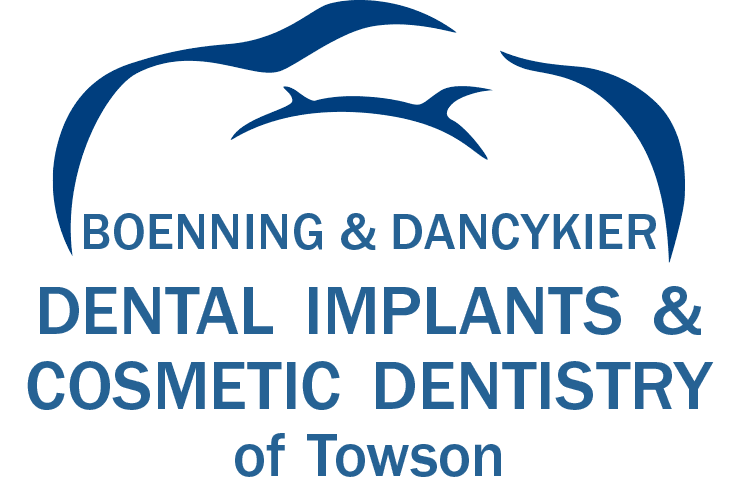TMJ disorders, also called TMD (temporomandibular joint disorder), refers to a group of conditions that affect the temporomandibular joints and the many muscles that surround it. Located on both sides of the face, this condition can be very painful and can lead to problems when you speak, bite into and chew food. Dr. Keith Boenning and Dr. Nathan Dancykier treat patients who suffer from TMJ disorders. They offer comprehensive TMJ treatment in Towson, MD for patients who are seeking relief from their TMJ pain. They help patients restore a comfortable bite and alleviate painful TMJ symptoms.
Understanding TMJ and TMD
The TMJ, or temporomandibular joints, connects your lower jaw to the base of your skull. The joints are located just in front of your ears on both sides of your head. The TMJ is one of the most complex joints in the body. They are responsible for all of your jaw movements, allowing you to open and close your mouth, chew, speak, yawn, and perform other essential functions.
These joints operate like a hinge but are also capable of sliding and rotating. This is what enables your jaw to have a wide range of motion and gives it the flexibility allowing you to chew your food and speak clearly.
There are many components that make up the TMJ such as discs, membranes, cartilage, and muscles. Given how complex it is and how often it is used, the TMJ is very susceptible to injury and certain kinds of conditions. These are grouped together and referred to as TMJ disorders or TMD, short for temporomandibular joint disorder.

The Root Causes of TMD
In most cases, it can be a challenge to pinpoint the root cause of TMD. However, we do know of many contributing factors. For most patients, their TMJ disorder often involves a combination of factors. The most common causes we tend to see include:
- Teeth grinding (bruxism)
- Teeth clenching
- Crooked teeth
- Misaligned jaw
- Jaw injury
- Dental work
- Muscles tension or stress
- Arthritis
As you can see, many of the causes involve the jaw and teeth. Seeking treatment and advice from a dentist can help you fix any damage caused by TMD as well as help prevent future damage. One of the most common risk factors for developing TMJ disorder is crooked or misaligned teeth. Improper contact between the teeth can lead to muscle tension and painful TMJ symptoms. Teeth grinding and clenching are also caused by stress and bite misalignment. Teeth grinding often occurs at night and the patient is not even aware they are doing it. Over time, this habit can lead tooth wear, cracked teeth, jaw pain, headaches, and damage to the TMJ.
TMJ Symptoms
While it may be hard to know if you have a TMJ disorder, you can look out for common signs and symptoms. Our dentists will also conduct a full evaluation of your teeth to look for obvious signs. If you suffer from any of these TMJ symptoms, please contact our office:
- Jaw pain and tenderness
- Teeth grinding
- Chronic headaches
- Pain in the face, neck, or shoulders
- Tooth wear
- Jaw popping, clicking, or a grating noise when you open or close your mouth
- Earaches or ringing in the ears (tinnitus)
- difficulty opening and closing mouth
TMJ Treatment in Towson, MD
Before treating these symptoms, Dr. Boenning or Dr. Dancykier will evaluate the joints for damaged tissue and teeth for wear and tear. One of the most common treatments for a TMJ disorder and bruxism is a nightguard. A nightguard is a custom oral appliance that is worn over the teeth, often during sleep.
A nightguard, also called a dental splint or occlusal splint, is a removable dental appliance that will protect your teeth and jaw while you sleep. When you clench your jaw or grind your teeth, the nightnight will prevent damage to your teeth and absorb the force to reduce the load on your TMJ. It is similar in appearance to a mouthguard. When worn consistently, the nightguard will provide a smooth surface for the opposing teeth to glide against and the teeth will remain unharmed.
Your nightguard will custom created by your dentist. They will take dental impressions and send the molds away to a dental lab where they will fabricate your custom guard. Once it returns to us, we will ensure it fits you properly and it comfortable. We will explain how to care for your new nightguard so that it lasts. You will wear it during the night to absorb the impact of bruxism and alleviate the pressure off of the jaw.
Mouth and jaw exercises can also be helpful if you have mild TMJ symptoms. These exercises relieve pain, strengthen the jaw muscles, reduce clicking and popping, and promote healing. We can recommend these exercises in conjunction with oral appliance therapy for the best results.
Frequently Asked Questions about TMJ Treatment
TMD and TMJ treatment can be confusing especially if you are not sure if that is even what you have. With many patients unsure of their treatment options, we understand there are many questions surrounding the subject. Please read through our common questions that patients may have about TMJ and the treatment process. Feel free to contact us if you have further questions or concerns.
Do I need surgery to treat TMJ?
You can address most TMJ problems with non-invasive and non-surgical dental treatments. Oral surgery is only necessary in severe cases of TMJ. We offer conservative treatment for TMJ and its often painful symptoms in our Towson office.
How do I know if I need TMJ treatment?
Request a consultation in our office, and we will evaluate your smile to determine if you require TMJ treatment. Symptoms like teeth clenching and grinding, jaw pain, and tooth wear are tell-tale signs of a TMJ disorder. It is important to seek help if the pain and discomfort are interfering with your everyday life.
What causes TMJ?
Stress, arthritis, jaw injury, and tooth misalignment are some of the most common causes of TMJ disorders. A misaligned bite or crooked teeth can trigger TMJ symptoms like teeth clenching and grinding. Be aware of these causes and any dental symptoms that may arise so we can treat you as soon as possible.
Can TMJ go away on its own?
TMJ can sometimes improve without treatment, particularly in mild cases. There are also home remedies and self-care practices that you can use to treat TMJ. However, these actions are temporary and do not get to the root cause of your TMJ symptoms. The condition can persist and worsen over time, leading to long-term complications. However, medical attention and treatment can help manage symptoms and prevent further damage to the joint.
Is TMJ a medical or dental problem?
TMJ is both a medical and dental problem. TMJ disorders the jaw, facial muscles, and surrounding structures. It also affects elements that relate to teeth and facial muscles. Dentists often diagnose and treat TMJ disorders because of their expertise in oral structures. However, medical professionals like oral surgeons, physical therapists, and ENT specialists can address TMJ issues. Therefore, it is a medical and dental problem requiring proper dental and healthcare attention.
What happens if you do not treat TMJ?
TMJ dysfunction can get worse if you do not get treatment. Increased pain, jaw stiffness, and difficulty opening or closing the mouth can all result from delaying therapy. Moreover, untreated TMJ problems can result in recurring headaches, earaches, and even damage to the teeth from continuous clenching or grinding. The condition of the TMJ may get worse in some circumstances. This will make treating the condition of the joint more difficult.
Find TMJ Treatment in Towson, MD
Do you want to treat jaw pain or chronic headaches? Call 410-324-2294 or request an appointment online for TMJ treatment in Towson, MD. Feel free to ask any questions you may have about your TMJ treatment with Dr. Boenning or Dr. Dancykier. They will be happy to help.
